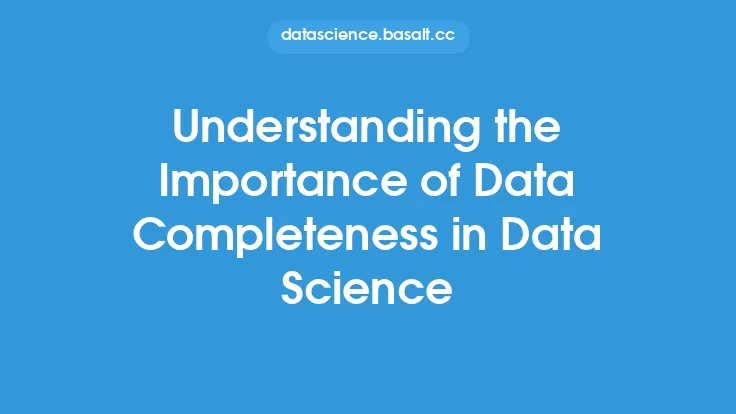Data completeness is a critical aspect of data quality in data science, referring to the extent to which a dataset contains all the required information to support a specific analysis or decision-making process. In other words, it measures how comprehensive and thorough a dataset is, with respect to the attributes, features, or variables that are relevant to the problem at hand. A complete dataset is one that includes all the necessary data points, with no missing or null values, and where all the relevant information is accurately captured.
Introduction to Data Completeness
Data completeness is often considered one of the most important dimensions of data quality, as it directly affects the accuracy and reliability of insights and models derived from the data. Incomplete data can lead to biased or incorrect conclusions, which can have significant consequences in business, healthcare, finance, and other fields where data-driven decision-making is critical. Therefore, ensuring data completeness is essential to guarantee the validity and usefulness of data analysis and modeling efforts.
Types of Data Incompleteness
There are several types of data incompleteness that can occur in a dataset, including missing values, null values, and incomplete records. Missing values refer to the absence of data for a specific attribute or feature, while null values indicate that the data is unknown or not applicable. Incomplete records, on the other hand, refer to instances where a record is missing one or more attributes or features. Additionally, data incompleteness can also arise from issues such as data entry errors, data integration problems, or data processing mistakes.
Causes of Data Incompleteness
Data incompleteness can arise from a variety of sources, including data collection issues, data processing errors, and data storage problems. For example, data collection instruments such as surveys or forms may not capture all the required information, leading to missing values or incomplete records. Similarly, data processing errors, such as data truncation or data aggregation, can also result in data incompleteness. Furthermore, data storage issues, such as data corruption or data loss, can also lead to incomplete data.
Consequences of Data Incompleteness
The consequences of data incompleteness can be severe, ranging from biased or incorrect insights to failed machine learning models. Incomplete data can lead to overfitting or underfitting of models, resulting in poor predictive performance or inaccurate conclusions. Additionally, data incompleteness can also lead to increased uncertainty and risk, as decisions made based on incomplete data may not be reliable or trustworthy. In extreme cases, data incompleteness can even lead to financial losses, reputational damage, or legal liabilities.
Technical Aspects of Data Completeness
From a technical perspective, data completeness can be evaluated using various metrics and methods, such as data profiling, data quality metrics, and data validation techniques. Data profiling involves analyzing the distribution of values in a dataset to identify patterns, trends, and anomalies. Data quality metrics, such as completeness, accuracy, and consistency, can be used to assess the overall quality of a dataset. Data validation techniques, such as data type checking and range checking, can be used to ensure that data values are valid and consistent.
Data Completeness in Relational Databases
In relational databases, data completeness is critical to ensure data consistency and data integrity. Relational databases use primary keys and foreign keys to establish relationships between tables, and data completeness is essential to maintain these relationships. For example, a customer record in a database should include all the necessary information, such as name, address, and contact details, to ensure that the customer can be uniquely identified and related to other tables, such as orders or payments.
Data Completeness in Big Data and NoSQL Databases
In big data and NoSQL databases, data completeness is also critical, but it can be more challenging to achieve due to the large volumes and variety of data. Big data and NoSQL databases often use flexible schema or schema-less designs, which can lead to data incompleteness if not properly managed. Additionally, the large volumes of data in big data and NoSQL databases can make it difficult to detect and correct data incompleteness issues. Therefore, specialized tools and techniques, such as data quality frameworks and data validation libraries, are often used to ensure data completeness in these environments.
Conclusion
In conclusion, data completeness is a critical aspect of data quality in data science, and it is essential to ensure the accuracy and reliability of insights and models derived from data. Data incompleteness can arise from various sources, including data collection issues, data processing errors, and data storage problems, and can have severe consequences, ranging from biased or incorrect insights to failed machine learning models. By understanding the types, causes, and consequences of data incompleteness, and by using various technical methods and tools, data scientists and analysts can ensure data completeness and guarantee the validity and usefulness of data analysis and modeling efforts.





